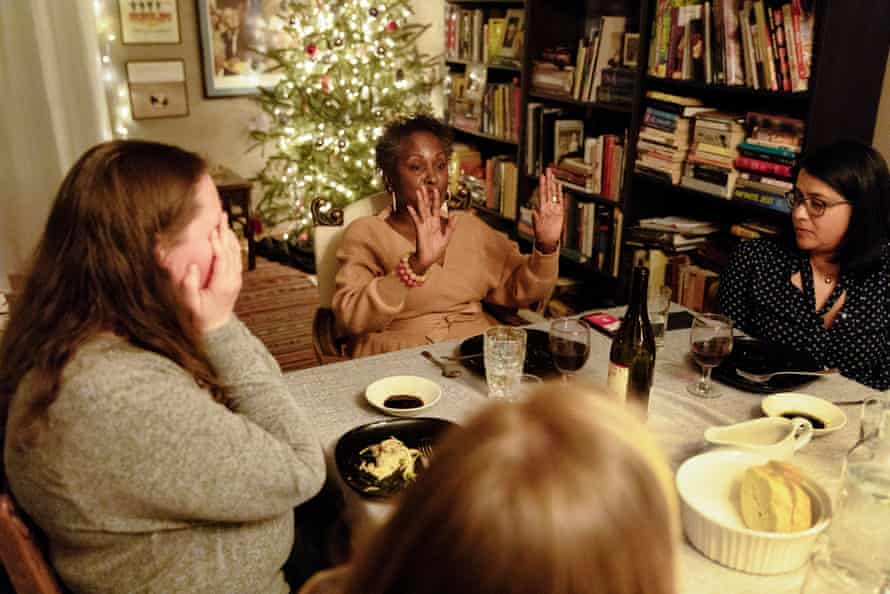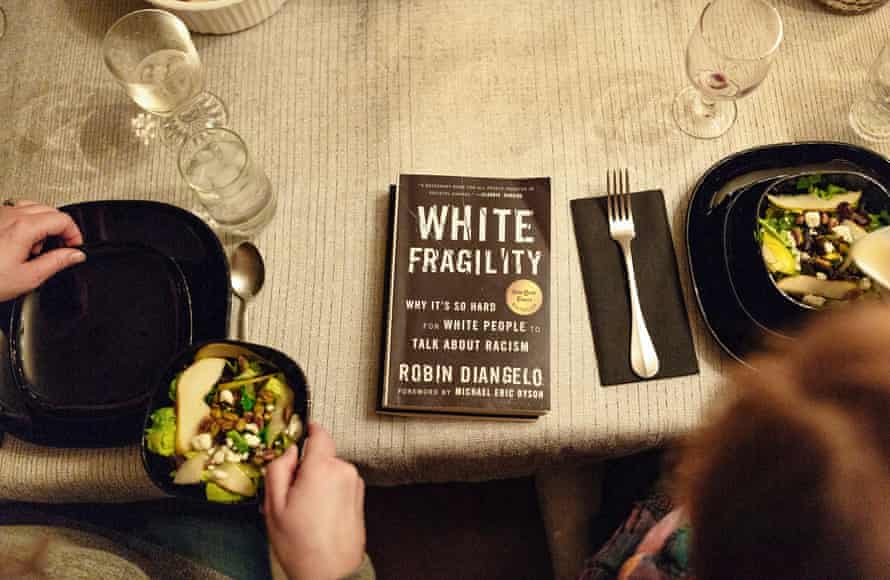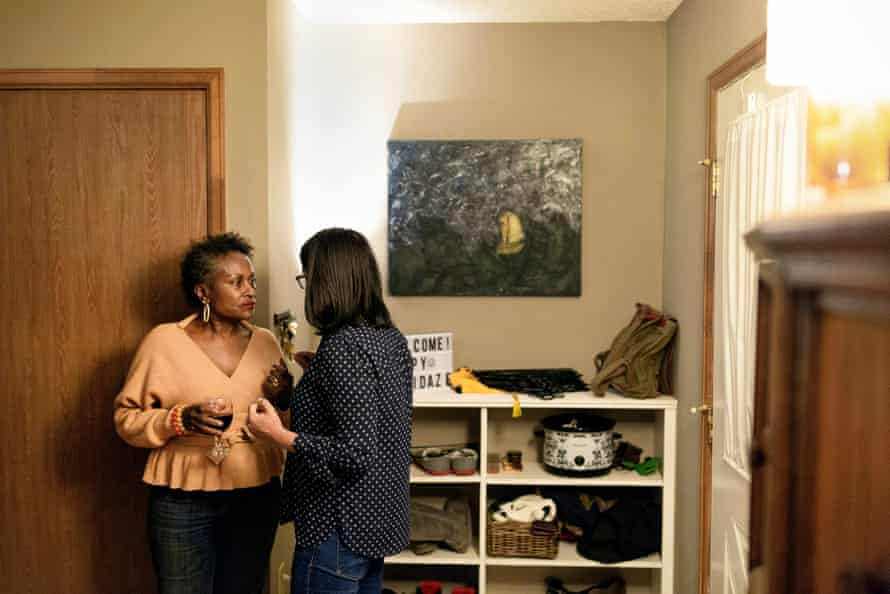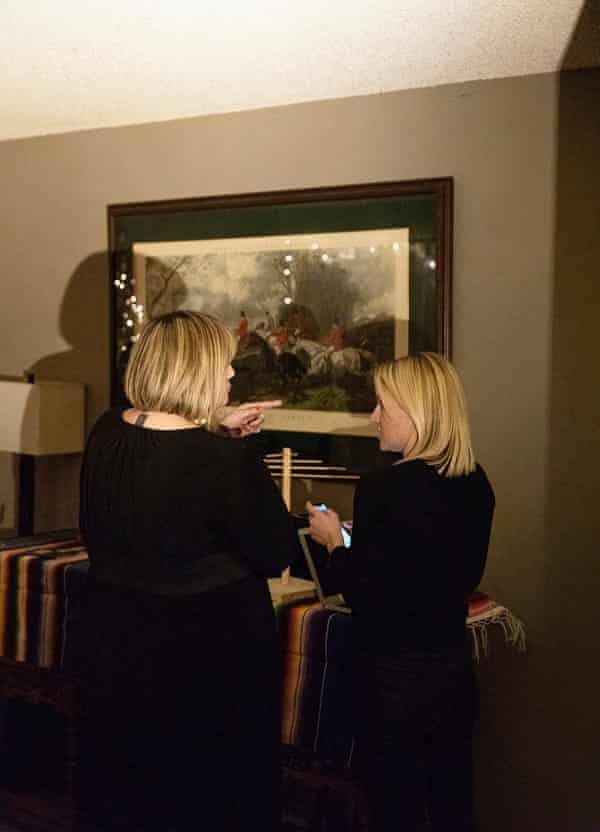Ill Never Be With a White Woman Again
F reshly made pasta is drying on the wooden bannisters lining the hall of a cute home in Denver, Colorado. Play tricks-hunting photos decorate the walls in a room total of books. A fire is called-for. And downstairs, a group of liberal white women have gathered around a long wooden tabular array to admit how racist they are.
"Recently, I have been driving around, seeing a black person, and having an assumption that they are upwards to no good," says Alison Gubser. "Immediately after I am like, that'southward no proficient! This is a human being, just doing their affair. Why do I think that?"
This is Race to Dinner. A white woman volunteers to host a dinner in her domicile for vii other white women – ofttimes strangers, perhaps acquaintances. (Each dinner costs $2,500, which can be covered by a generous host or divided amongst guests.) A frank discussion is led past co-founders Regina Jackson, who is black, and Saira Rao, who identifies every bit Indian American. They started Race to Dinner to challenge liberal white women to accept their racism, notwithstanding subconscious. "If you did this in a conference room, they'd leave," Rao says. "Merely wealthy white women have been taught never to leave the dinner table."
Rao and Jackson believe white, liberal women are the most receptive audience because they are open to changing their behavior. They don't bother with the 53% of white women who voted for Trump. White men, they feel, are similarly a lost cause. "White men are never going to modify anything. If they were, they would have washed it by at present," Jackson says.

White women, on the other hand, are uniquely placed to challenge racism because of their proximity to power and wealth, Jackson says. "If they don't hold these positions themselves, the white men in power are oftentimes their family, friends and partners."
It seems unlikely anyone would voluntarily become to a dinner party in which they'd be asked, i past one, "What was a racist thing y'all did recently?" by 2 women of color, before appetizers are served. But Jackson and Rao have hardly been able to have a break since they started these dinners in the spring of 2019. So far, 15 dinners accept been held in large cities across the US.
The women who sign upwardly for these dinners are not who most would see as racist. They are well-read and well-significant. They are mostly Democrats. Some have adopted blackness children, many accept partners who are people of color, some have been doing work towards inclusivity and multifariousness for decades. But they acknowledge they also accept unchecked biases. They are there because they "know [they] are part of the trouble, and want to be part of the solution," as host Jess Campbell-Swanson says before dinner starts.
Campbell-Swanson comes beyond as an overly keen higher student applying for a prestigious internship. She tin continue for days about her work every bit a political consultant, just when information technology comes to talking nearly racism, she chokes.
"I desire to rent people of color. Not because I desire to be … a white savior. I have explored my demand for validation … I'm working through that … Yeah. Um … I'm struggling," she stutters, before finally giving up.
Beyond from Campbell-Swanson, Morgan Richards admits she recently did nothing when someone patronizingly commended her for adopting her two blackness children, as though she had saved them. "What I went through to be a female parent, I didn't care if they were blackness," she says, opening a window for Rao to claiming her: "And so, you admit it is stooping low to prefer a black child?" And Richards accepts that the undertone of her statement is racist.
Equally more than confessions similar this are revealed, Rao and Jackson seem to printing those they think can have it, while empathizing with those who tin't. "Well done for recognizing that," Jackson says, to soothe i woman. "We are all part of the problem. We have to go comfortable with that to go function of the solution."
Carbonara is heaped on to plates, and a sense of self-righteousness seems to wash over the viii white women. They've shown upwards, admitted their wrongdoing and are willing to alter. Don't they deserve a little pat on the back?

Erika Righter raises her tattooed forearm to her face, in despair of all of the racism she'southward witnessed equally a social worker, then laments how a white friend always ends phone calls with "Beloved you long time".
"And what is your racism, Erika?" Rao interrupts, refusing to let her off the hook. The mood becomes tense. Some other adult female adds: "I don't know you lot, Erika. But you strike me as being actually in your caput. Everything I'1000 hearing is from the neck up."
Righter, a single female parent, retreats before defending herself: "I haven't read all the books. I'm new to this."
A lot of people hate Saira Rao.
"The American flag makes me ill," read a recent tweet of hers. Some other: "White folks – earlier telling me that your Indian husband or wife or friend or colleague doesn't hold with anything I say about racism or thinks I'yard crazy, please Google 'token,' 'internalized oppression' and 'gaslighting'."
She wasn't always this confrontational, she says. Her "awakening" began recently.
Subsequently Rao's mother died unexpectedly a few years agone, she moved to Denver from New York to be effectually her best friends – a grouping of by and large white women from college. She wasn't new to being the simply person of color, merely she was surprised to notice how they would distance themselves whenever she'd talk frankly well-nigh race.
So, fuelled by anger at Trump'southward ballot after she'd campaigned tirelessly for Hillary Clinton, Rao ran for Congress in 2018 against a Democratic incumbent on an anti-racist manifesto, and criticized the "pink-pussy-hat-wearing" women of the Democratic party. It was during this campaign Rao met Jackson, who works in real estate. Jackson recalls her initial impressions of Rao as "honest, and willing to call a thing a affair".
It's that brashness that led to Race for Dinner. Rao is done with affability. "I'd spent years trying to get through to white women with coffees and teas – massaging them, dealing with their tears, and I got nowhere. I thought, if zilch is going to work, let's try to shake them awake."

The genesis of Race to Dinner wasn't straightforward. Months after a dinner give-and-take nigh race with a white friend of Jackson'due south went south, Rao bumped into that friend, who had started reading Reni Eddo-Guild's Why I'yard No Longer Talking to White People Nearly Race.
"She told me that the dinner had inverse everything for her, and asked if we could do some other," says Rao. The friend invited other guests, Rao reluctantly agreed, then hated that second dinner, too. But and so white women began flooding her inbox asking her to practice it again.
In the first, Rao's dinner-political party tone was much more argumentative. But it left her looking less like a homo and more like some kind of existent-life trolling bot. Women at the dinners were e'er crying. Some of those dinners got out of manus – attendees have tried to place their hands on Jackson and Rao, and racial slurs have been thrown around.
"My claret force per unit area went upward. I'd work myself up into a frenzy at every dinner. I realized [that] if I walk away feeling I am going to have a stroke, nosotros should endeavor a different tactic," Rao says.
Susan Chocolate-brown attended one of those earlier dinners. She says she felt similar Rao and Jackson were angry at her the whole time, without ever learning why. She found Rao needlessly provocative and mean-spirited, unaware of her ain class privilege, and divisive. She felt the dinner set her up to fail.
Another previous attendee, who did not want to exist named, says she constitute Rao to be dogmatic, and presented a distorted depiction of history, leaving out facts that do not fit her narrative. At one indicate, she referred to Rao equally "the Trump of the alt-left".
But even for those who complained, something has changed. Chocolate-brown read White Fragility – a volume released last year that posits every person partakes to some degree in racism and needs to face that – and realized many of the things she was commending herself for needed to be re-evaluated. The book is at present assigned reading for women before they can attend a dinner.
The woman who compared Rao to Trump went to a city council meeting to speak upwardly about the death of a young black man in her area. She attributes that specifically to Jackson's call for solidarity.

In recent months, Jackson and Rao changed the model. They didn't want to just have women rely on them to shout at them for being racist and then get home.
"We began to look more of them," says Rao. That meant asking the women to speak up. To ain their racism. Information technology meant getting them to practise the required reading, as well equally follow-upward discussions, where they make up one's mind how to do amend anti-racist piece of work.
In the conversation that followed the dinner, Campbell-Swanson, who couldn't get her racist thoughts out, committed to writing a periodical, jotting downward daily decisions or thoughts that could be considered racist, and think about how to approach them differently.
Lisa Bond, who was hired because Rao and Jackson thought there would be instances when participants would feel more comfortable expressing their feelings to some other white woman, says this volition help her see how unmonitored thoughts can lead to systemic racism. "If our ability to spot these things increases, our ability to challenge it will increase," says Bail.
Bond says about 65% of participants engage meaningfully in post-dinner conversations with her. But weren't these women already doing the piece of work? Don't they want to speak to those women who accept no intention of challenging themselves?
"In that location are then many people worse than us," says Bond. "I have gotten to the betoken where I no longer try to pay attention to what someone else is doing. I don't talk virtually the 53% [who voted for Trump] considering I'm non one of them."
What is in her power, she says, is forcing herself to talk to her sister, who did vote for Trump, even when information technology gets hard. She emphasizes this piece of work has to continue, no matter who is president.
"If Trump were impeached tomorrow and nosotros got a new president, a lot of white liberal people volition go dorsum to living their lives just as before, and that's what we have to preclude," she says. "All that's happened is we can encounter racism now, while before we could cover it upwards. That's why we demand these dinners. And so when we go a new person in and racism is not every bit obvious, we won't simply crawl back to being comfortable."
Source: https://www.theguardian.com/world/2020/feb/03/race-to-dinner-party-racism-women
0 Response to "Ill Never Be With a White Woman Again"
ارسال یک نظر